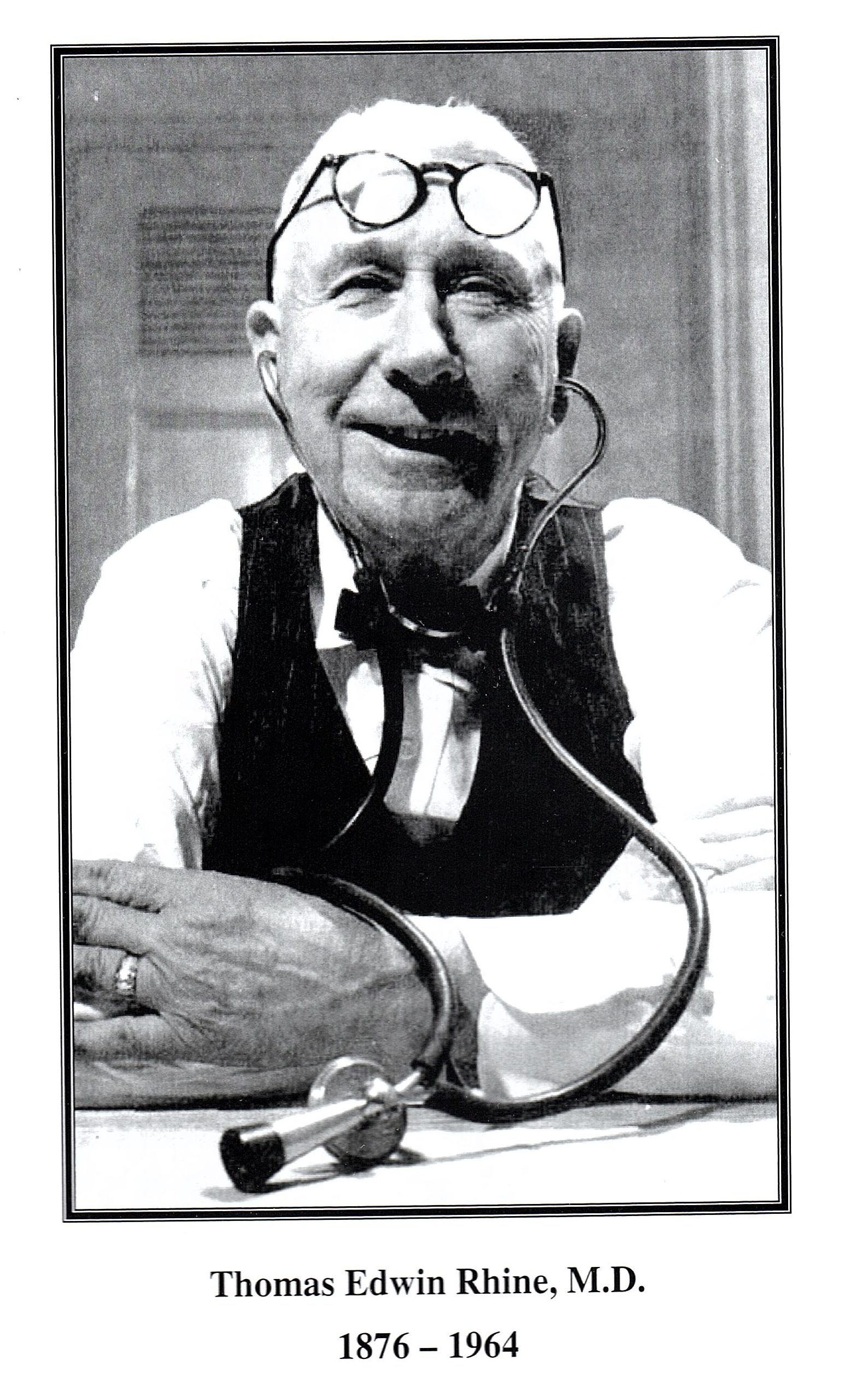Dr. Rhine was born near Lexington, Holmes County, in Mississippi April 2, 1876, the son of John Thomas and Susan Elizabeth Weeks Rhine. He was the second child in the family with one sister older and two younger. His great grandfather had migrated from Germany to North Carolina in 1765. The family moved from Mississippi to Rison, Arkansas in 1881 when Dr. Rhine was 5 years old. He received his early education in the country schools of Cleveland County and graduated in the first graduating class in Fordyce, Arkansas.
Later he graduated from Clary Training School and then continued his education at the old Memphis Hospital Medical School. Dr. Rhine practiced medicine in Thornton Arkansas in Ouachita County from1899 to 1964, a total of 65 years. He died at the age of 86 on September 23, 1964.

During WWI Dr. Rhine served as a 2ndLieutenant in the U. S. Army Medical Corp. Following the war he married Nanita Raines in September of 1925 in Little Rock, Arkansas. The couple had three children, Virginia Elizabeth, Susan Ethel and Patricia Edwina.
After his first year of practice he was named head surgeon and physician for Stout Lumber Company and remained with them until it closed in 1927. Throughout this time he continued in his private practice. In all his years in practice he delivered more than 7000 babies; in some families he cared for 6 generations; diagnosed the first case of tularemia in Arkansas; assisted in founding the Dallas County Hospital in Fordyce, and was on its staff until his death; was the Calhoun County Health Officer for many years; helped establish the American Legion in Ouachita County; served on the Thornton School Board for several years and thereafter a new high school was dedicated to him.
He was honored several times: named Doctor of the Year in Ouachita County and the Physician of the Year in Arkansas in 1948, and was runner up of the American Medical Society’s General Practitioner of the Year in 1950. He was an avid hunter and was named Fox Hunter of the Year in 1956.
To reach his patients, he has used a horse, a bicycle, his first Model T bought in 1913, log trains, a freight train cabooses, rowboats, even his own legs to get to his patients. At the age of 88 he was still making house calls within a 20-mile radius, though he said he was trying to cut back on the midnight to daylight calls.
His daughter wrote “he never sent a bill, never kept a medical chart except in his head and never charged preachers, teachers, widows or families of men in service or care for dogs.” In 1946 the town of Thornton held a “Thank you, Dr. Rhine Day” More than 8000 attended. Again in July 2002, thirty-eight years after his death, his daughter invited people to come tell Dr. Rhine stories. About 100 came and gave interviews of the kindness and skill of the old doctor. Pat Rhine Brown, his daughter compiled a book of these interviews. (T.E. Rhine, M.D. Recollections of an Arkansas Country Doctor) in which she wrote, “he believed in friends, fellowship and professional stature. An excerpt from an interview (p. 243-245) by Jack Gresham demonstrates Dr. Rhine’s stature in the community. “I recall many wonderful things about Dr. Rhine in the school years and his interest in the school. He was a member of the local school board for thirty-five years, and took it upon himself to check on the school from time to time—Usually he came during assembly time (we called chapel)—and he took his accustomed place by the piano on the main floor just to the right of the stage. I can still see him with his arm propped on the top of the piano as he viewed the proceedings of the assembly. More often than not, the superintendent would close the chapel by saying ‘Dr. Rhine, would you like to say a word?’ and Dr. Rhine was always prepared to give words of wisdom and encouragement to the pupils assembled there. –he provided medals for student for excellence at the close of the school year. It was a highlight–to see who got the Dr. Rhine medals—certainly he was one who practiced friendship as well as medicine. The role of the medical doctor today is a far cry from that of the country doctor, which characterized the practice of Dr. Rhine. He was unacquainted with the nine to four working day, with weekends off. Had he operated under such a schedule, he would probably have lived to be hundred, but then, he wouldn’t have been Dr. Rhine. Thinking back, I can appreciate him more now for his dedication, his genuine concern for all of his patients—black or white, rich or poor. He truly was one of a kind.”
Dr. Rhine was a beloved old country doctor, dedicated to all who came to him. He spanned the period in history where beginning scientific and high technology were little known and yet as an avid reader kept up with the coming changes that could best served his patients.
L. Battenfield March 20, 2004